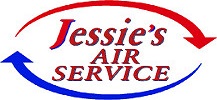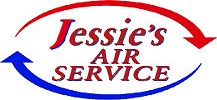Our Air Conditioning Experts' Competent Advice
We at Jessie’s Air Services are aware of the power of a little assistance. We’re glad to respond to inquiries about your air conditioning because we believe in providing straightforward guidance. Call us or send us a note if you can’t find the details you need here.
Is central air available in every home?
If you’re willing to spend money on ductwork and include it into the design, central air conditioning may be added to almost any house. But before you make that choice, arrange a home consultation with an HVAC professional like Jessie’s Air Services. We can explain alternative cooling choices like ductless split systems and give you a clearer understanding of what would be involved.
When should I replace my old air conditioner?
The ideal time to do this is before your present system breaks and you are forced to quickly choose a replacement. The good news is that there are a few indicators that it’s time to start considering your options: your unit is older than ten years old, it’s not keeping up with your needs, you’ve seen a significant rise in the expense of operating it, or it requires frequent refrigerant refills. Sometimes a straightforward repair is all that’s required, but if investing additional money in your AC is no longer safe or practicable, we’ll explain that as well and offer suggestions for the most suitable replacement.
How long does a typical air conditioner last?
If properly maintained, many air conditioners can last 15 to 20 years. While you might require a few repairs along the road, your Jessie’s Air Services specialist will typically find and address minor issues during your yearly Clean & Check.
How can I determine the size of air conditioner my home requires?
When you add or replace a cooling system, you should speak with a qualified HVAC technician like those at Jessie’s Air Services who are both licenced and insured. We’ll perform an accurate calculation that takes into account the design and size of your property, the typical climate, the quantity and kind of windows, insulation, and even the number of occupants. Without taking these factors into account, you risk having either a system that is too huge and repeatedly cycles on and off, wasting energy, or one that is too small and can’t keep up with your cooling needs.
Describe SEER.
There is a seasonal energy efficiency rating for every air conditioner (SEER). Your unit is more efficient the higher that number gets. The current standard for new air conditioners in the industry is 13, but cutting-edge equipment can achieve a SEER as high as 21. Although the latter may have a greater initial cost, you will actually save money over the course of the system due to the reduced monthly operating costs.
What should I check before calling Jessie’s Air Services if my air conditioner isn’t working?
Using the auto setting will ensure that the fan only activates when it is necessary to maintain the desired temperature, which will help you save money on cooling costs. However, select the on setting for continuous airflow if you like a more constant temperature. Due to the system’s ongoing filtering of the air that passes through it, choosing this option may also be advantageous if you suffer from allergies or asthma.
Should the thermostat fan switch be set to “auto” or “on” when my air conditioner is running?
Check the basics before calling us: check the batteries in your thermostat, look for a blown fuse or tripped breaker, replace your air filter, confirm that the system is set to cool, and confirm that the setting is at least three degrees lower than the present room temperature. If none of these five straightforward issues are the cause, give us a call for a thorough cooling system inspection.
Why does my air conditioner freeze after running for a while?
There are several causes for this, and almost all of them call for the assistance of a qualified specialist. Make sure your air filter is clean and that the airflow is not impeded before anything else. If the filter was the problem, you can hasten the thawing process by switching off your system, then turning on the fan only. Just make sure to return the settings to normal afterward. Low refrigerant, a filthy evaporator coil, a bad blower motor, or a relay problem are further potential causes.
Is there anything I can do to increase the energy efficiency of my air conditioner?
Here are some quick strategies to reduce your summer energy consumption and cooling expenses:
- Verify that all air vents are unblocked and open.
- Get a programmed thermostat to prevent your AC from running continuously while you are away.
- Do routine maintenance and filter replacements.
- Use ceiling fans so you can turn your thermostat up a few degrees and still feel comfortable.
How frequently does my AC require maintenance?
Maintenance of your air conditioner should be on your list of spring cleaning tasks. Although regular preventative maintenance will lengthen the life of your unit, there comes a time where fixing your air conditioner is no longer financially viable. When the time comes, Jessie’s Air Services will guide you through the process of comparing new systems and selecting the best option for your house and budget.
Should I cover my outside appliance throughout the winter?
The outdoor condenser shouldn’t be covered because it was made to resist the elements. The constrained airflow could result in significant damage if the cooling system is unintentionally activated prior to the cover being removed. As an alternative, we advise a spring Clean & Check so that our expert may clear out any debris, lubricate moving parts, and make standard corrections to get your AC ready for the next summer.
Do you provide window a/c maintenance?
The majority of the time, window air conditioner repairs are not practical. But before you do, think about a ductless mini split system as a better alternative. Because you can lock your windows and run lines through just a three-inch hole in the wall, it is more effective, considerably quieter, and safer than central air because it can cool a room without ducting or one that is frequently too hot despite having it.


